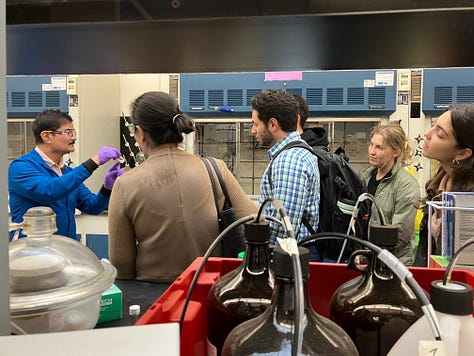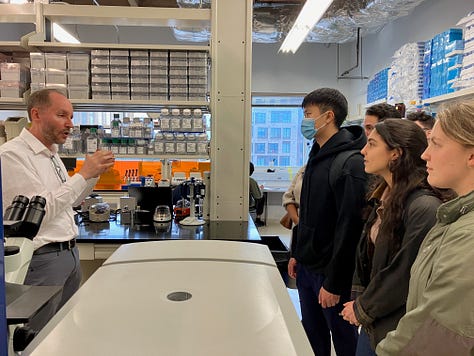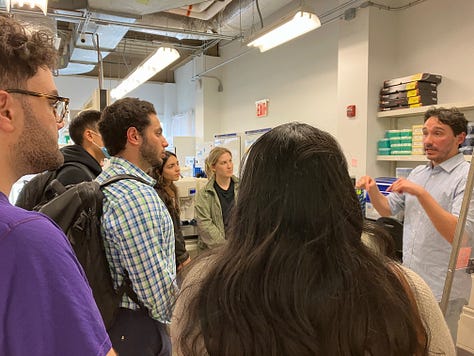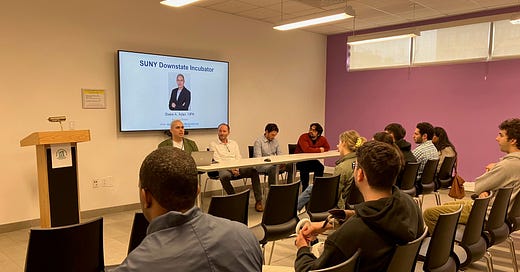Biotech Innovation at Our Fingertips: A Student Experience at SUNY Downstate Biotechnology Incubator
In May, the Medical Entrepreneurship Club at SUNY Downstate hosted a student tour of the Downstate Biotechnology Incubator and Tech at @ 710. With 30 students participating, the event aimed to offer insights into the biotech ecosystem and inspire future medical entrepreneurs.
The tour began with an overview of the incubator's mission to support early-stage biotech companies. The incubator provides cutting-edge lab and office space essential for fostering innovation. We then split into three groups to tour the SUNY Downstate Biotechnology Incubator and Tech @ 710, meeting with teams from three resident companies.
The incubator spans 50,000 square feet and includes specialized labs and office spaces. It primarily supports biotech and tech companies, providing essential resources for early-stage development. The Tech @ 710 building is an additional chemistry lab with specialized equipment for materials processing.
During our visit, we engaged with executives from three companies:
ChemFinity: Dr. Ever Velasquez, Co-Founder & CTO, discussed developing new materials for molecular separations, emphasizing sustainability and energy efficiency.
Jillion Therapeutics: Dr. Marc Flajolet, Founder & CEO, presented his drug-discovery platform based on DNA-encoded library technology with the capacity to screen hundreds of millions of compounds.
Mirimus: Dr. Giuseppe Militello, Director of RNAi Therapeutics, highlighted the potential of RNA and nucleic acids in developing therapeutic tools.
We toured advanced labs and observed cutting-edge research, from gene editing techniques to innovative drug delivery systems.



The workshop focused on crucial aspects of biotech entrepreneurship, including startup funding, intellectual property rights, and regulatory landscapes, offering valuable insights into the business side of biotechnology. At the end of our tours and Q&A session, one participant noted, “This tour opened my eyes to the entrepreneurial opportunities in biotech and the resources available right here at Downstate.”
The Importance of Biotechnology for Medical Students
Introducing medical students and future health professionals to the world of biotech startups is vital. It offers research opportunities, provides real-world examples of career paths, and shows how medical knowledge can solve healthcare and biomedical science problems. Access to state-of-the-art technology on campus fosters innovation and encourages students to think creatively.
Fostering innovative thinking in medical school is crucial for developing future leaders who can adapt to and address emerging healthcare challenges. Biotech engineering, particularly in medicine and climate studies, is essential for budding health professionals. These fields intersect to create solutions that improve patient care and address global health and environmental issues. Planting the seed of entrepreneurial thinking in these student’s education curriculum allows them to look forward in their educations through an innovative lens.
During the COVID-19 pandemic, the RNA lab in the incubator was transformed into RNA testing sites. By repurposing existing lab and company technologies, they significantly contributed to managing the overburdened testing infrastructure during the pandemic. This adaptability showcased how innovative thinking and resourcefulness could address new health crises effectively, and adaptability in business planning allows companies to pivot their business model to solve emerging gaps in healthcare.
Key Takeaways
Innovative Projects
We encountered startups working on sustainable bioplastics and novel DNA and RNA modifier treatments, showcasing biotech's potential to address global and genetic challenges.
Insights
Lessons included the importance of resilience, networking, and staying informed about industry trends. Trial and error was highlighted as a stepping stone to success, just as much as pivoting towards the opportunities that open up along the way.
The Entrepreneurial Journey
The journey to starting a company is unique for everyone. Some begin companies to fulfill urgent needs, others join existing companies and rise through the ranks, and some see opportunities transform into something new.
Conclusion
The SUNY Downstate Medical Entrepreneurship Club remains committed to fostering a culture of innovation. The tour of the Downstate Biotechnology Incubator provided invaluable insights and inspiration. It emphasized the crucial role of innovation in healthcare and encouraged the development of future medical entrepreneurs. For entrepreneurs, the moment of lift is different for everyone and cannot really be fully replicated again. Thus, the best way to navigate a journey in biotech entrepreneurship is to inquire about scientific gaps and find out who is looking for answers.




